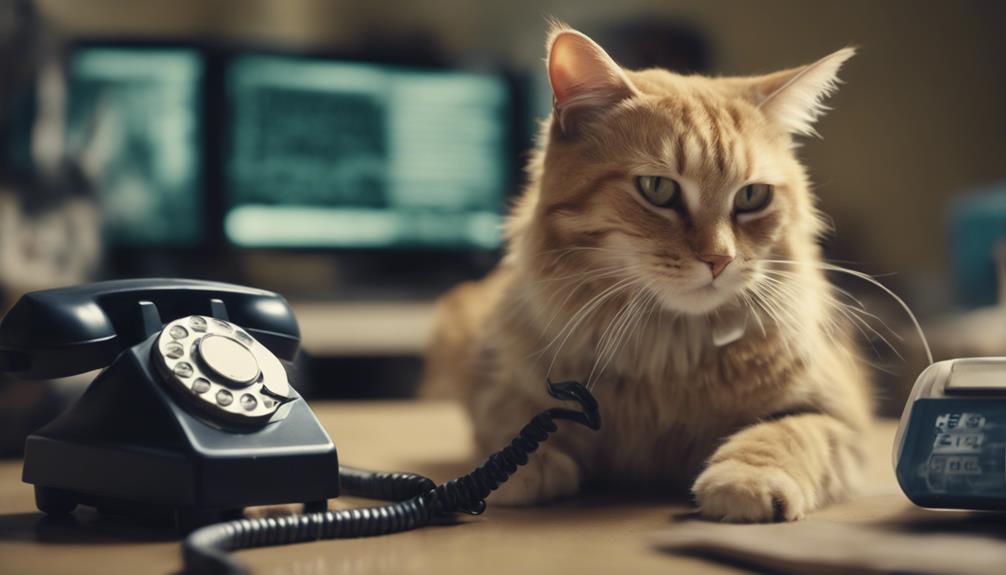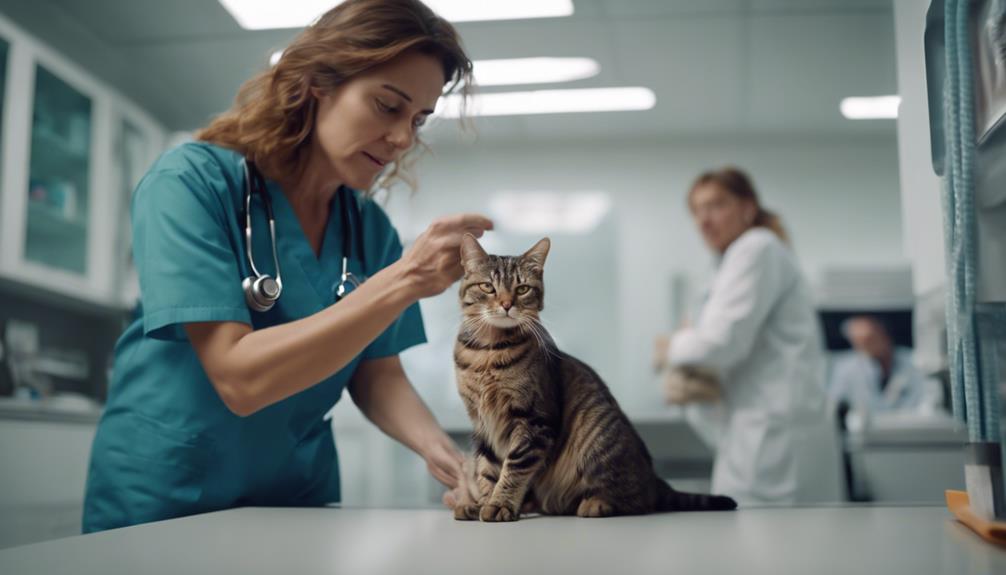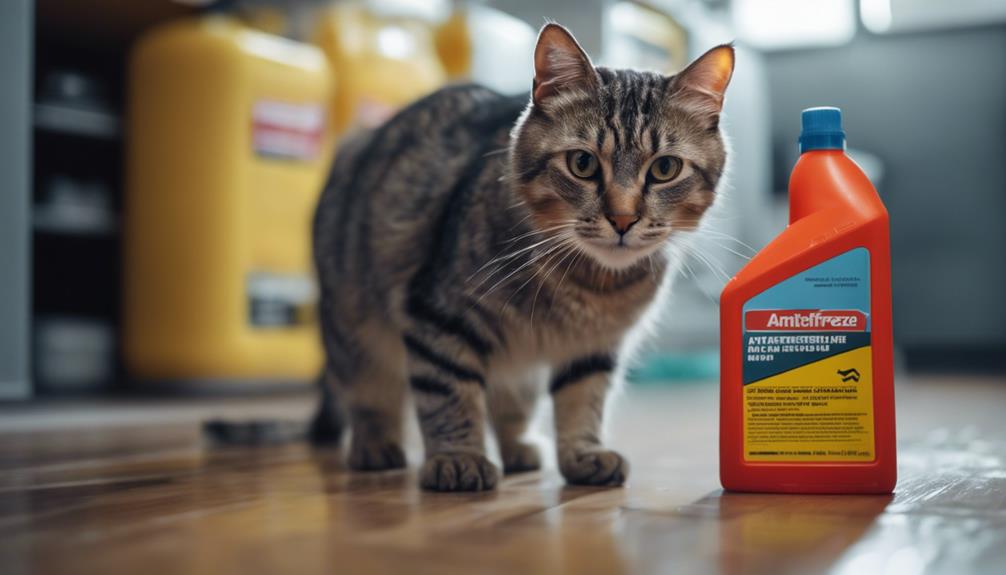Understanding the urgency of addressing a potential antifreeze ingestion by a cat is paramount. The toxicity of ethylene glycol can lead to dire consequences for feline health, necessitating swift action.
From recognizing the subtle signs of poisoning to the critical steps required for mitigating harm and securing timely veterinary intervention, the gravity of this situation cannot be overstated.
As we delve further into the necessary actions and precautions to safeguard your cat's well-being, it becomes evident that vigilance and prompt response are crucial in such scenarios.
Key Takeaways
- Act quickly and seek veterinary care for antifreeze poisoning in cats.
- Early symptoms include vomiting, drooling, and excessive thirst.
- Treatment involves inducing vomiting and preventing kidney damage.
- Cats can suffer irreversible organ damage without prompt treatment.
Recognizing Signs of Antifreeze Poisoning
When observing a cat suspected of antifreeze poisoning, vigilance in recognizing early signs such as vomiting, drooling, and increased thirst is crucial for prompt intervention. Cats, being sensitive to ethylene glycol, can quickly deteriorate without timely treatment.
If you notice your cat displaying these symptoms, it is imperative to seek veterinary help immediately. Early detection and intervention can make a significant difference in the outcome of antifreeze poisoning cases. Remember, even a small amount of antifreeze can have severe consequences for your feline companion.
Immediate Actions to Take
Upon suspecting antifreeze poisoning in your cat, immediate actions must be taken to increase the chances of a positive outcome. Time is of the essence in such situations, and acting swiftly can be life-saving for your furry friend. Here are some crucial steps to take:
| Immediate Actions | Description |
|---|---|
| 1. Remove Access | Prevent further ingestion by removing any remaining antifreeze. |
| 2. Contact Vet | Notify your veterinarian immediately for guidance. |
| 3. Do Not Delay | Time is critical; do not wait for symptoms to worsen. |
| 4. Observe Closely | Monitor your cat for any changes in behavior or symptoms. |
| 5. Do Not Induce Vomiting | Unlike some toxins, do not attempt to induce vomiting without professional advice. |
Calling the Veterinarian

Contacting a veterinarian promptly is crucial when dealing with a suspected case of antifreeze poisoning in your cat. Antifreeze poisoning in cats can have severe consequences, especially if not addressed promptly.
When you call the veterinarian, be prepared to provide details about your cat's symptoms, the amount of antifreeze they may have ingested, and the time of exposure. The veterinarian will guide you on the next steps, which may include inducing vomiting, administering activated charcoal, and providing supportive care.
Transporting Your Cat Safely
For safe transport of your cat during a veterinary emergency, ensure proper containment and minimize stress levels to support their well-being. Use a secure carrier that is well-ventilated, comfortable, and escape-proof. Place familiar bedding or clothing with your scent in the carrier to provide comfort.
Avoid sudden movements and loud noises during transport to keep your cat calm. Speak softly and reassuringly to help reduce anxiety. Place the carrier in a stable position in your vehicle, away from direct sunlight and drafts. Ensure the carrier is securely fastened to prevent shifting during travel.
Monitor your cat's condition during the journey and drive carefully to minimize any additional stress. Your cat's safety and comfort are paramount during transportation to receive urgent veterinary care.
Vet's Treatment Procedures

When addressing antifreeze poisoning in cats, veterinarians typically initiate treatment procedures promptly to mitigate potential kidney damage and ensure the best possible outcome for the affected feline. This often involves inducing vomiting to remove any remaining antifreeze from the stomach and administering intravenous medications to counteract the poison's effects.
Quick action is crucial as antifreeze can rapidly lead to severe kidney damage if left untreated. By promptly addressing the poisoning, veterinarians aim to minimize the risk of long-term kidney issues and increase the chances of a successful recovery for the cat.
Owners should seek immediate veterinary care if they suspect their cat has ingested antifreeze to give their feline companion the best chance at a positive outcome.
Hospitalization and Monitoring
How crucial is hospitalization and monitoring in the treatment of cats suffering from antifreeze poisoning?
Hospitalization is vital for cats with antifreeze poisoning as it allows for close monitoring of their condition and immediate intervention if needed. Cats may require intravenous fluids, medications to prevent kidney damage, and supportive care during their hospital stay. Monitoring their vital signs, kidney function, and overall health is essential to assess their response to treatment and adjust the care plan accordingly.
Continuous observation by veterinary staff ensures prompt action in case of any deterioration or complications. Hospitalization provides the best chance for a successful outcome and minimizes the risk of irreversible organ damage in cats affected by antifreeze poisoning.
Antifreeze Poisoning Recovery Process

Initiating a structured recovery plan following antifreeze poisoning in cats is imperative for ensuring a successful outcome and mitigating potential long-term health consequences. After the initial treatment, which may include induced vomiting and IV medication, close monitoring and follow-up care are essential.
Cats may need to be hospitalized for observation to prevent irreversible kidney damage. Veterinary professionals will continue to assess kidney function, provide supportive care, and monitor for any signs of complications. Additionally, they may recommend specific dietary changes or medications to support kidney health post-poisoning.
Owners play a crucial role in the recovery process by following all post-treatment instructions diligently and ensuring their cat receives the necessary care and attention for a full recovery.
Long-Term Kidney Damage
Long-term kidney damage resulting from antifreeze poisoning in cats can have lasting implications on their overall health and quality of life. This damage can significantly impact the well-being of your feline companion, requiring ongoing care and attention. Here are key points to consider:
- Regular Monitoring: After antifreeze poisoning, it is crucial to monitor your cat's kidney function regularly through blood tests to assess any changes or deterioration over time.
- Specialized Diet: Cats with kidney damage may benefit from a specialized diet that supports kidney health and function, helping to manage symptoms and slow down the progression of the damage.
- Hydration Management: Ensuring your cat stays well-hydrated is essential for supporting kidney function and overall health, as proper hydration can help flush out toxins and maintain organ function.
Antifreeze Prevention Tips

Following long-term kidney damage resulting from antifreeze poisoning in cats, implementing effective antifreeze prevention measures is paramount to safeguarding your feline companion's health and well-being.
To prevent accidental ingestion, store antifreeze in secured cabinets or high shelves inaccessible to cats. When using antifreeze, ensure all spills are immediately cleaned up, as even small amounts can be enticing to cats. Consider switching to pet-safe alternatives like propylene glycol-based antifreeze.
Additionally, educate yourself and others about the dangers of antifreeze to raise awareness in your community. By taking these preventive steps, you can significantly reduce the risk of antifreeze poisoning in your beloved cat and promote a safe environment for them to thrive in.
Understanding Cat's Sensitivity
Cats exhibit a heightened vulnerability to the toxic effects of antifreeze due to their unique sensitivity to ethylene glycol. This sensitivity can lead to severe consequences if a cat ingests even a small amount of antifreeze. Understanding this sensitivity is crucial for cat owners to take preventive measures and act swiftly in case of ingestion.
To grasp the depth of a cat's vulnerability to antifreeze poisoning, consider the following:
- Cats have a lower tolerance for ethylene glycol compared to other animals.
- Even a small quantity of antifreeze can be life-threatening for cats.
- Quick identification and intervention are essential to prevent irreversible harm to a cat's health.
Risks of Antifreeze Ingestion

Considering the heightened vulnerability of cats to the toxic effects of antifreeze due to their unique sensitivity to ethylene glycol, understanding the risks associated with antifreeze ingestion is paramount for cat owners in safeguarding their pets' health and well-being. Antifreeze, containing ethylene glycol, is highly toxic to cats, with just a small amount being potentially fatal.
Ingesting antifreeze can lead to rapid kidney damage in cats, often within hours of exposure. Cats, drawn to antifreeze due to its smell, taste, or color, may exhibit early signs like vomiting, drooling, and increased thirst. Without prompt veterinary care, antifreeze poisoning can progress to lethargy, seizures, and coma, causing irreversible harm.
Prevention and immediate treatment are crucial in combating the severe risks associated with antifreeze ingestion in cats.
Handling Data for Advertising
In modern marketing practices, the strategic handling of data for advertising plays a pivotal role in tailoring personalized campaigns to target audiences effectively.
- By leveraging data analytics, marketers can gain insights into consumer behavior and preferences, allowing for the creation of highly targeted and relevant advertisements.
- Utilizing customer data ethically and transparently helps build trust and fosters long-term relationships with the audience.
- Continuous monitoring and analysis of advertising performance metrics enable marketers to refine strategies and optimize campaigns for better engagement and conversion rates.
Frequently Asked Questions
Can Antifreeze Poisoning Be Reversed Completely With Treatment, or Will There Always Be Lasting Effects on the Cat's Health?
Antifreeze poisoning in cats, if promptly treated, can prevent irreversible kidney damage. However, there may still be lasting effects on a cat's health, depending on the severity of the poisoning. Professional veterinary care is crucial for a good prognosis.
Are There Any Alternative Treatments or Home Remedies That Can Be Used for Antifreeze Poisoning in Cats if a Veterinarian Is Not Immediately Available?
While seeking alternative treatments or home remedies for antifreeze poisoning in cats due to unavailability of immediate veterinary care, it is crucial to prioritize a prompt visit to a veterinarian. Early professional intervention significantly enhances the prognosis and minimizes potential irreversible damage.
How Long Does It Typically Take for a Cat to Show Symptoms of Antifreeze Poisoning After Ingestion, and Is There a Window of Time Where Treatment Is Most Effective?
Symptoms of antifreeze poisoning in cats can appear within hours of ingestion, with a window of opportunity for treatment effectiveness typically within the first few hours. Prompt veterinary care is crucial to prevent irreversible kidney damage.
Are There Any Specific Tests or Diagnostics That Veterinarians Use to Confirm Antifreeze Poisoning in Cats, and How Accurate Are These Tests?
Veterinarians confirm antifreeze poisoning in cats through blood tests detecting ethylene glycol levels or its toxic metabolites. Tests like a biochemistry panel or urinalysis can reveal kidney damage. These diagnostics are accurate and crucial for timely treatment.
What Are the Potential Costs Associated With Treating Antifreeze Poisoning in Cats, and Are There Any Financial Assistance Options Available for Pet Owners Facing This Emergency Situation?
Treating antifreeze poisoning in cats can incur significant costs due to hospitalization, medication, and monitoring. Financial assistance options like pet insurance or care credit may aid owners. Immediate veterinary care can prevent irreversible kidney damage and ensure the best outcome.
Conclusion
In conclusion, recognizing the signs of antifreeze poisoning in cats is crucial for prompt intervention to prevent irreversible harm. Immediate actions must be taken, including contacting a veterinarian and safely transporting the cat for treatment.
Understanding the risks of antifreeze ingestion and implementing prevention tips are essential in safeguarding feline health. Veterinary care plays a vital role in the treatment process, emphasizing the importance of quick and effective intervention in cases of potential antifreeze exposure.




